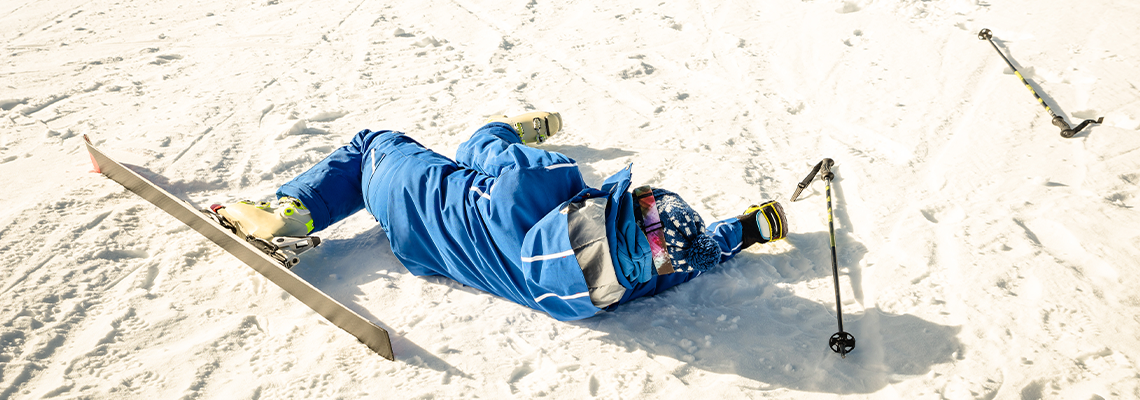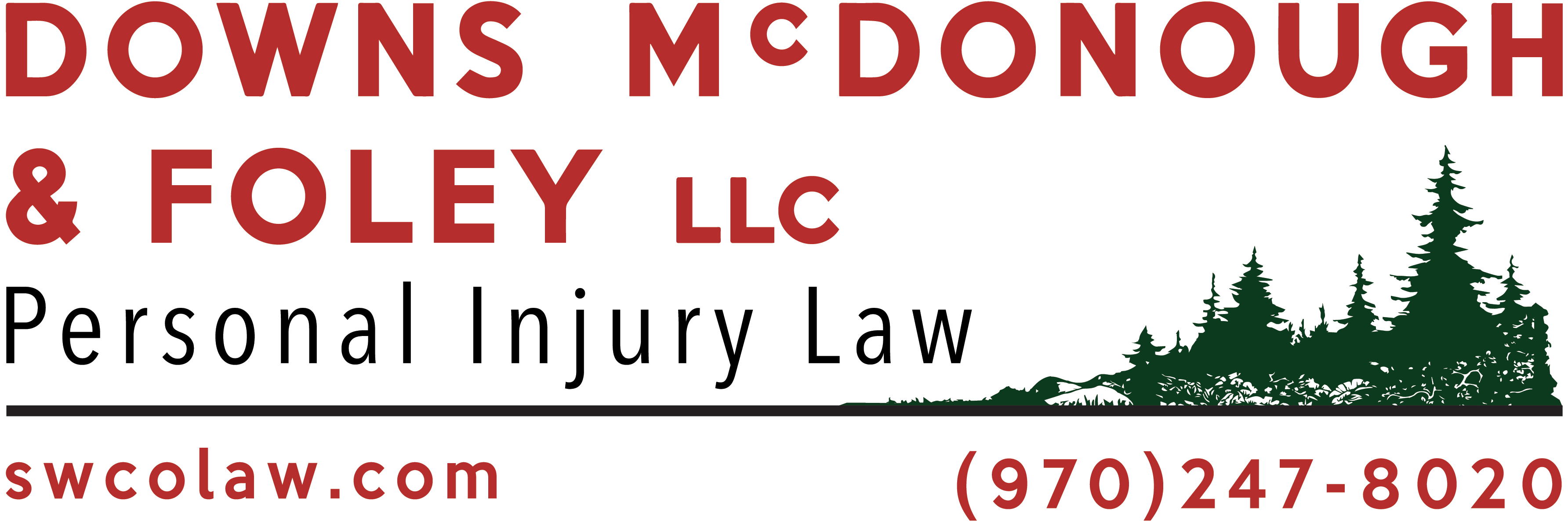
Frequently Asked Questions About Ski Accidents
Skiing is a popular winter activity that offers excitement and breathtaking scenery, but accidents on the slopes can lead to serious injuries. Collisions, equipment failures, and hazardous conditions can all contribute to life-altering harm.
Understanding your legal options after a ski accident is essential, especially when negligence plays a role. Seeking compensation for medical expenses, lost wages, and pain and suffering can be a complicated process.
At Downs, McDonough, Cowan & Foley in Durango, Colorado, we help injured skiers hold responsible parties accountable. A personal injury attorney from our firm can assess the details of your case and determine the ideal path forward.
Knowing what to do after a ski accident and how liability is determined can make a significant difference in your claim. Read on for more information about your rights after a ski accident.
What Are the Most Common Causes of Ski Accidents?
Ski accidents can happen for many reasons, often involving a combination of environmental factors, human error, and equipment issues. While some falls are unavoidable, others result from negligence that could have been prevented.
Collisions between skiers and snowboarders are among the most frequent causes of accidents. Reckless skiing, failure to yield, and excessive speed can create dangerous situations on the slopes.
Poorly maintained ski runs, hidden obstacles, and sudden weather changes can also increase the likelihood of injuries. When negligence is involved, determining who is responsible is a key part of the legal process.
Who Can Be Held Liable for a Ski Accident?
Liability in a ski accident depends on the circumstances of the incident. Skiers, snowboarders, resorts, and equipment manufacturers may all share responsibility, depending on the details of the case. Holding the correct party accountable is essential for recovering compensation.
Ski resorts have a duty to maintain safe conditions, properly mark trails, and warn skiers of hazards. If they fail to do so, they may be liable for injuries that occur as a result. Other skiers can also be responsible if they behave recklessly or disregard posted rules.
Equipment failures, such as faulty bindings or defective helmets, may point to manufacturer liability. Determining liability requires strong evidence, making documentation an important step after an accident.
What Should You Do After a Ski Accident?
Taking the right steps after a ski accident can help protect your health and strengthen your legal claim. Documenting the scene, gathering witness statements, and seeking medical attention are all critical actions to take.
Some important steps to consider include:
Seek medical attention: Even if injuries seem minor, a medical evaluation can identify hidden issues and create a record of your condition.
Report the accident: Notify ski patrol or resort staff about the incident, making sure that an official report is created.
Take photos and videos: Capture images of the accident scene, equipment involved, and any visible injuries.
Get witness statements: If anyone saw the accident, collect their contact information and ask for a written statement.
Preserve equipment: Don't alter or dispose of damaged gear, as it may serve as crucial evidence.
Following these steps can help establish negligence and provide valuable support for a legal claim. Once an accident is documented, it's important to understand what types of injuries commonly occur in ski accidents.
What Are the Most Common Ski Accident Injuries?
Skiing injuries can range from minor bruises to severe, life-altering conditions. The force of impact from falls, collisions, or equipment malfunctions can lead to significant harm. Some injuries may require extensive medical treatment and long-term rehabilitation.
Head injuries, including concussions and traumatic brain injuries, are among the most serious consequences of ski accidents. Broken bones, particularly in the legs, arms, and wrists, are also common due to the force exerted during falls.
Ligament tears, such as ACL injuries, can result from awkward landings or twisting motions. While these injuries can be severe, knowing whether you have a legal case is the next step in pursuing compensation.
How Do You Know If You Have a Legal Claim?
Not every ski accident results in a valid legal claim, but when negligence is involved, injured skiers may have grounds for compensation. Determining whether a lawsuit is an option depends on the circumstances surrounding the accident.
If another skier acted recklessly or failed to follow posted rules, they could be liable for resulting injuries. Similarly, if a ski resort neglected safety regulations or failed to warn of known hazards, they may be responsible for damages.
Equipment failures that lead to injury may also justify legal action against the manufacturer. Proving negligence is crucial in these cases, requiring a strong foundation of evidence.
How Is Negligence Proven in a Ski Accident Case?
Proving negligence in a ski accident case involves demonstrating that the responsible party failed to act with reasonable care, leading to the injury. This process requires gathering evidence and establishing a clear connection between the negligent action and the accident.
Some critical factors to evaluate include:
Duty of care: Establishing that the defendant had a legal responsibility to act in a reasonably safe manner.
Breach of duty: Showing that the defendant failed to uphold this responsibility, such as a reckless skier or a negligent ski resort.
Causation: Demonstrating that the defendant's actions directly led to the accident and resulting injuries.
Damages: Proving that the victim suffered actual harm, including medical expenses, lost wages, and pain and suffering.
These elements must be thoroughly documented to support a successful claim. Once negligence is established, victims need to understand what compensation may be available.
What Compensation Can You Recover After a Ski Accident?
Victims of ski accidents may be entitled to compensation for both economic and non-economic damages. The amount awarded depends on the severity of injuries and the impact on the victim's life.
Economic damages include medical expenses, rehabilitation costs, and lost wages due to time away from work. Non-economic damages cover pain and suffering, emotional distress, and loss of enjoyment of life.
In cases of extreme negligence, punitive damages may be awarded to hold the responsible party accountable. Knowing how to proceed with a legal claim is essential for securing the justice you deserve.
How Can a Personal Injury Attorney Help With a Ski Accident Claim?
A personal injury attorney plays a crucial role in helping ski accident victims manage the legal process. From investigating the accident to negotiating with insurance companies, legal representation can make a significant difference.
An attorney can gather evidence, consult with professionals, and build a strong case to prove negligence. They can also handle communications with insurance companies, making sure that victims aren't pressured into accepting low settlements.
If necessary, a personal injury attorney can take the case to court to fight for full and fair compensation. Understanding how long you have to file a claim is also critical in these cases.
How Long Do You Have to File a Ski Accident Lawsuit?
The time limit for filing a ski accident lawsuit varies by state, as each jurisdiction has its own statute of limitations. Missing this deadline can result in losing the right to seek compensation.
In most cases, personal injury claims must be filed within a few years of the accident. However, certain factors, such as injuries discovered later or claims against government entities, may alter the timeline.
Consulting with a personal injury attorney as soon as possible helps you complete that legal action within the required time frame.
Ski accidents can lead to devastating injuries and financial burdens, especially when negligence is involved. Understanding your legal rights and taking the proper steps after an accident can make a significant difference in your recovery.
Compassionate Representation
Our experienced personal injury attorneys serve clients throughout Durango, Pagosa Springs, Cortez, and the Four Corners region. We've been helping clients for over 20 years.
If you or a loved one has been injured in a ski accident, contact Downs, McDonough, Cowan & Foley today. Our attorneys are dedicated to helping with your legal aspects so you can focus on your recovery.

